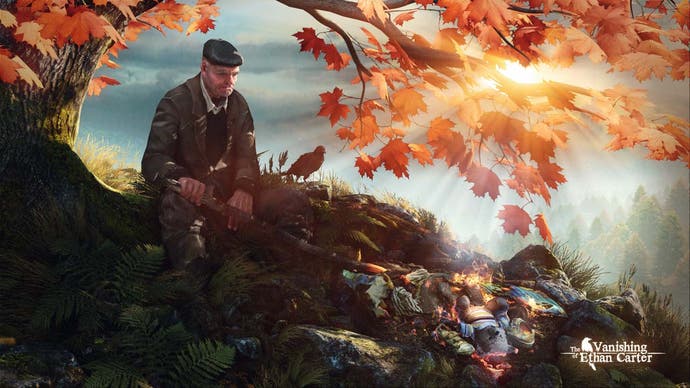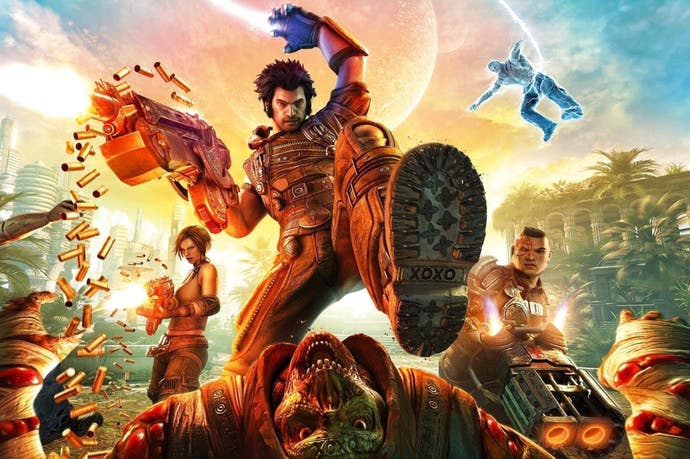Adrian Chmielarz on Bulletstorm 2 ideas, Gears of War: Judgment changes and why he left People Can Fly
"It was gonna be actually more insane in a way."
There was a concept for Bulletstorm 2, and People Can Fly founder Adrian Chmielarz believed it would have made "an amazing game".
"It was gonna be actually more insane in a way. It's still kinda believable but the pulpiness and the craziness of it was through the roof," he told me at Polish conference Digital Dragons.
"Whoever read Rick Remender's crazier comic book series, those people know what I'm talking about here. When he basically lets go, he fires with all cannons. Things are really truly insane in his signature series Fear Agent. But reading his Fear Agent series was like OK, this is madness, but you care about the characters and it's good storytelling.
"The thing is," he added, "we did want to make Bulletstorm 2, and actually there was a concept and, I think, it would be an amazing game."
Making Bulletstorm 2 "amazing" meant righting the wrongs of Bulletstorm 1, and, "Wow," Chmielarz remarked, "that could be an entire book."

One example was the game's potty-mouth and the complaints of profanity received as a result. Originally there was a loading screen that warned of "very graphic language", but it was elbowed to the options menu "so people don't have to go through [lots] of screens when they open the game - they want to play, right?".
"We moved it to the options and it was the worst decision ever," he rued. "Nobody noticed it and people were complaining.
"The absolute excellent solution is in Brutal Legend when the guy gets hit or something and he goes 'Oh f-!' and the game asks you, 'What do you want [him] to say?' And then they ask you one more time a little bit later.
"The thing was," he added, "our replacements were not beeping out words - no! We actually wrote phrases that were actually funny and completely different just to compensate for the lack of the swearwords. So some blame is on us. We shouldn't have done that, we should have appreciated the problem."
Adrian Chmielarz, like Cliff Bleszinski, also didn't like Bulletstorm's marketing campaign. "I think it was bad," he said.
"The way I blamed myself for it was I basically enjoyed it too much. Initially I asked can we do it so it sells the game as an action-adventure, a pulp sci-fi rollercoaster, and not do the Bad Company 1-style of campaign of silliness and jokes? And then they showed me some marketing materials and I was laughing and like, 'OK that's funny, let's do this,' and that was a mistake."
His requests for a "more serious tone" finally paid off with the game's launch trailer, which is "different to any other marketing that was done for Bulletstorm". "No more Duty Calls and any of that bulls***," he said. "That was simply good, action-adventure, pulp sci-fi. But that was too little, too late."
"You don't have that many examples of games where the first part was doing so-so ... and then the sequel suddenly kaboomed."
Adrian Chmielarz
There were things out of his and People Can Fly's control, too, like the global economic crisis. "We were one of the first victims," he believes, a type of game that, if released in 2010 or 2009, would have sold at $60 like many before it. But in 2011 the reaction was 'oh hell no'. "'$60 dollars? I want like 100,000 hours of gameplay out of this game.'"
"That's why, since Bulletstorm, I don't think there's a game - even sequels - where you have 8-10 hours single-player with multiplayer no one cares about ... that basically sold well since 2011."
Epic Games has acknowledged publicly that Bulletstorm 2 was in development, but if the game was under way and the studio was keen on it, why was it People Can Fly switched to doing Gears of War: Judgment instead? Was Epic pulling rank?
"We analysed what we could for the sequel, what we have control over, and it would be an amazing game. But it was also very risky, because you don't have that many examples of games where the first part was doing so-so - it wasn't a failure but it was very so-so - and then the sequel suddenly kaboomed," said Chmielarz. "So it was a big risk.
"And Epic asked us would you want to do Gears? They did not impose the game on us. We wanted to do it. I don't know if the entire team wanted to do it because it still wasn't our game, but me personally, I was ecstatic, because I loved Gears. I was still in the pre-rewiring mode," he laughed, referencing his new direction with studio The Astronauts and new game The Vanishing of Ethan Carter, which features no combat.
"I absolutely loved Gears, like seriously, I fell in love with Gears before we [PCF] were even a part of Epic. I was like 'OK, this is going to be something really special'.
"Obviously there is the dream and there is the reality, so, you know... But the decision was ours actually, the decision was on the PCF side."
"I wouldn't want Bulletstorm in Gears. It was supposed to be, in my vision, a really dark fight for survival."

Adrian Chmielarz left People Can Fly when Gears of War: Judgment was in alpha, so he was influential in how it eventually turned out. But, he said, "They still changed a couple of things I do not agree with," although whether they would have made the game better or worse he cannot say.
Adrian Chmielarz wanted Gears of War: Judgment to be "a really dark fight for survival". "I definitely didn't want the player to get bonuses for performing heroic - for performing actions that are actually really stupid on the battlefield. Because finishing an enemy that you can just spend one bullet on him and he's done, or doing this elaborate whatever when bullets are still firing, that's just no to me.
"I wouldn't have any headshot bonuses counting towards the three-star ratings; the executions wouldn't count towards the rating; and all these things that are in a really weird way Bulletstormy - I wouldn't want Bulletstorm in Gears. It was supposed to be, in my vision, a really dark fight for survival.
"The reward for the headshot was supposed to be intrinsic not extrinsic. The reward was supposed to be, because the ammo was scarce, OK I only used one bullet instead of three. That was your reward in my version."
He also "fought hard" to prevent the game taking control of the scene away from the player for walk-and-talk sequences or cinematics besides those needed for linking the end of levels with the start of new ones.
"That didn't happen," he said. "It was replaced by very good, quality-wise, in-game cinematics when they introduce a monster or something. So that was something for something. The presentation was more Gearsy, like in the previous games, but the player agency was a little bit hurt this way.
"But again, I will always emphasise that I don't know, maybe I was completely wrong, maybe they've done some research and it turns out that Gears players actually want something that more reminds them of the previous experiences.
"We will never know, right? Some of the things stayed like the difficulty - it's a more intense game, and that's what I wanted."
"Am I done with guns firing and violence? No, no - on the contrary. We are still debating it, but I think Ethan is going to be actually a fairly violent game."
Adrian Chmielarz left People Can Fly, the studio he'd founded in 2002 and taken from obscurity to blockbuster popularity, in mid-2012, when Epic Games bought up the remaining shares in the company.
The split, he told me, "was not directly related, and I'm still under NDA so I still cannot disclose the details, but it felt like the stars aligned at this point".
"We started to lose a little of the joy of creation when at PCF, so what happened was really good for us. It's not that there's anybody to blame, it's just how things are when there's this big developer that's an older brother or father figure - Epic - and it's obvious PCF did not have full freedom and should not have full freedom.
"When you feel like whatever you want to do needs to go through so many channels, and ideas are killed for a reason you don't agree with - and maybe it was really good that they were killed, but I don't know, it's not my responsibility, I cannot take the glory for it but I also cannot take the blame.
"This felt basically like I'm half-submersed in a pudding, trying to do things," he said. And then he remembered the days of Painkiller and making decisions "like [clicks fingers] that", not that that was always a good thing. "But still, the joy of creation was just great there, so from that point of view I think the stars aligned."
He mentioned his mental rewiring about game development above, and it's no understatement. He had an epiphany playing Dear Esther and that was how The Vanishing of Ethan Carter was born.
"Am I done with shooters, with this [Bulletstorm, Gears] kind of shooters? Yes, I'm done. Am I done with guns firing and violence? No, no - on the contrary. We are still debating it, but I think Ethan is going to be actually a fairly violent game."
You can do "an incredible amount of things" with the mechanic of a shooting a gun, he argued. "It's like you have a pencil and a piece of paper and you can do a zillion things with this." Just because the mechanic is simple does not mean the end result has to be.
Games that can't decide if they're about stories or gaming, though - or if they're equal-parts both and intersperse action with story - "Yes," he said, "with these kind of games, definitely done."


